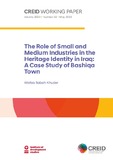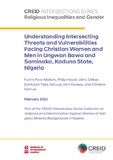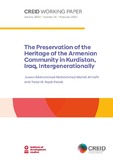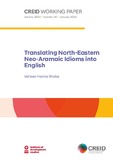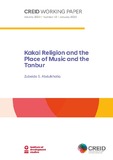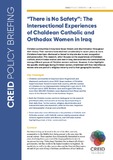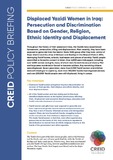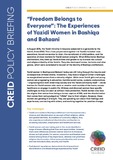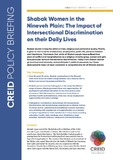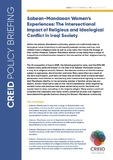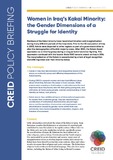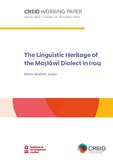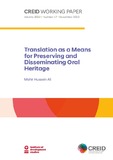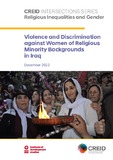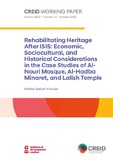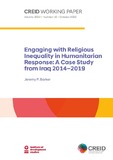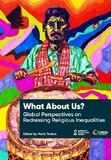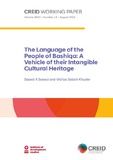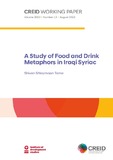Coalition for Religious Equality and Inclusive Development (CREID)
Browse by
The Coalition for Religious Equality and Inclusive Development (CREID) provides research evidence and delivers practical programmes which aim to redress the impact of discrimination on the grounds of religion or belief, tackle poverty and exclusion, and promote people’s wellbeing and empowerment. CREID is led by the Institute of Development Studies in partnership with Al-Khoei Foundation, Minority Rights Group and Refcemi (the Coptic Office for Advocacy and Public Policy). Find out more: CREID
Recent Submissions
-
The Role of Small and Medium Industries in the Heritage Identity in Iraq: A Case Study of Bashiqa Town
(Institute of Development Studies, 2023-05-09)This paper aims to identify the most famous Yazidi heritage industries in the town of Bashiqa, in Nineveh governorate. It explores the economic, social and cultural reality of three non-material industries (the manufacture ... -
Understanding Intersecting Threats and Vulnerabilities Facing Christian Women and Men in Ungwan Bawa and Saminaka, Kaduna State, Nigeria
(Institute of Development Studies, 2023-02-08)This research aims to comprehend the interconnecting threats and vulnerabilities facing underprivileged women from marginalised religious groups in Nigeria from the angle of gender discrimination from their neighbouring ... -
The Preservation of the Heritage of the Armenian Community in Kurdistan, Iraq, Intergenerationally
(Institute of Development Studies, 2023-02-06)This topic is significant because it considers the language of an ethno-religious group, the Armenian people, in Iraq with non-Arab or Kurdish origins. The Armenian people did not originate from Iraq but from Armenia, one ... -
Translating Northeastern Neo-Aramaic Idioms into English
(Institute of Development Studies, 2023-01-17)Northeastern Neo-Aramaic (also known as NENA) languages and literature are a prosperous and encouraging field of research. They abound with oral traditions and expressions that incorporate various spoken forms including ... -
Kakai Religion and the Place of Music and the Tanbur
(Institute of Development Studies, 2023-01-13)This paper discusses the historical context and mythic framework of the Kakai religion. While some information regarding Kakai theological views and beliefs may be known to outsiders, many facets of their religious life, ... -
“There is No Safety”: The Intersectional Experiences of Chaldean Catholic and Orthodox Women in Iraq
(Institute of Development Studies, 2022-12)This CREID Policy Briefing provides recommendations to address the marginalisation and discrimination faced by Chaldean Catholic Christian women in Iraq. Christian communities in Iraq have faced threats and discrimination ... -
Identity, Nationality, Religion and Gender: The Different Experiences of Assyrian Women and Men in Duhok, Iraq
(Institute of Development Studies, 2022-12)This CREID Policy Briefing provides recommendations to address the marginalisation and discrimination experienced by Assyrians in Iraq. Assyrian women and men face different challenges and barriers due to the gender roles ... -
Displaced Yazidi Women in Iraq: Persecution and Discrimination Based on Gender, Religion, Ethnic Identity and Displacement
(Institute of Development Studies, 2022-12)This CREID Policy Briefing provides recommendations to address the marginalisation, discrimination and exclusion faced by displaced Yazidi women in Iraq. Throughout the history of their presence in Iraq, the Yazidis have ... -
“Freedom Belongs to Everyone”: The Experiences of Yazidi Women in Bashiqa and Bahzani
(Institute of Development Studies, 2022-12)This CREID Policy Briefing provides recommendations to address the marginalisation, discrimination and exclusion faced by Yazidi women in Bashiqa and Bahzani. Yazidi women in Bashiqa and Bahzani today are still living ... -
Shabak Women in the Nineveh Plain: The Impact of Intersectional Discrimination on their Daily Lives
(Institute of Development Studies, 2022-12)This CREID Policy Briefing provides recommendations to address the discrimination and marginalisation faced by the Shabak community in the Nineveh Plains in Iraq. Shabak women in Iraq live within a tribal, religious and ... -
Sabean-Mandaean Women’s Experiences: The Intersectional Impact of Religious and Ideological Conflict in Iraqi Society
(Institute of Development Studies, 2022-12)This CREID Policy Briefing provides recommendations to address the marginalisation, discrimination and exclusion faced by Sabean-Mandaean women in Iraq. Within the Sabean-Mandaean community, women are traditionally seen ... -
Women in Iraq's Kakai Minority: the Gender Dimensions of a Struggle for Identity
(Institute of Development Studies, 2022-12)This CREID Policy Briefing provides recommendations to address the marginalisation, discrimination and exclusion faced by Kakai women in Iraq. Members of the Kakai minority have faced discrimination and marginalisation ... -
The Linguistic Heritage of the Maṣlāwī Dialect in Iraq
(Institute of Development Studies, 2022-12-15)This paper deals with the linguistic heritage of the Maṣlāwī dialect in Iraq spoken by the diverse communities in the city of Mosul, known for its very rich cultural heritage in northern Iraq. Fears among the speakers of ... -
Translation as a Means for Preserving and Disseminating Oral Heritage
(Institute of Development Studies, 2022-12-15)Protecting the heritage of communities is a means to revive them. The goal of the current paper is to explore how translation can be utilised as an effective tool for the preservation, survival, and dissemination of the ... -
Violence and Discrimination Against Women of Religious Minority Backgrounds in Iraq
(Institute of Development Studies, 2022-12-06)This volume is part of the Intersections series which explores how the intertwining of gender, religious marginality, socioeconomic exclusion and other factors shape the realities of women and men in contexts where religious ... -
Rehabilitating Heritage After ISIS: Economic, Sociocultural, and Historical Considerations in the Case Studies of Al-Nouri Mosque, Al-Hadba Minaret, and Lalish Temple
(Institute of Development Studies, 2022-11-04)This paper explores three case studies of the Al-Nouri Mosque, Al-Hadba Minaret, and Lalish Temple in the aftermath of the ISIS war of 2014–17 and the occupation of Nineveh governorate. It analyses the role of these sites ... -
Engaging with Religious Inequality in Humanitarian Response: A Case Study from Iraq 2014–2019
(Institute of Development Studies, 2022-10-26)This paper explores how religious diversity dynamics shaped humanitarian assistance efforts in the context of large-scale displacement due to conflict in Iraq, and what actions were taken to engage with religious inequalities ... -
What About Us? Global Perspectives on Redressing Religious Inequalities
(Institute of Development Studies, 2022-10-26)How can we make religious equality a reality for those on the margins of society and politics? This book is about the individual and collective struggles of the religiously marginalised to be recognised and their inequalities, ... -
The Language of the People of Bashiqa: A Vehicle of their Intangible Cultural Heritage
(Institute of Development Studies, 2022-08-23)The current study is an attempt to provide a linguistic, a historical, as well as a sociocultural record of the language variety spoken in Bashiqa (Northern Iraq) by one of the communities which represents a religious ... -
A Study of Food and Drink Metaphors in Iraqi Syriac
(Institute of Development Studies, 2022-08-23)This study investigates the ways in which Syriac native speakers from Iraq conceptualise their understandings of various abstract domains, feelings, emotions, actions, customs, traditions and practices through their ...

